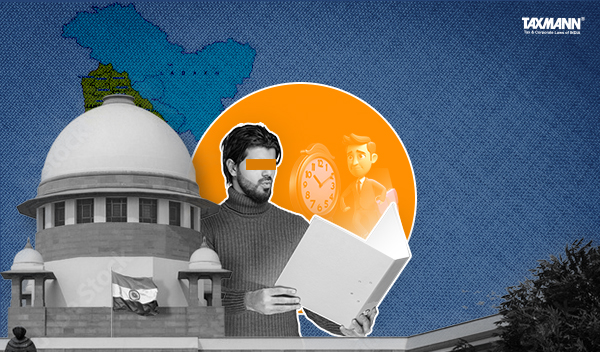HC Can Only Condone Delay in Exceptional Cases Even If Statute Prohibits Such Condonation | J&K HC
- News|Blog|GST & Customs|
- 2 Min Read
- By Taxmann
- |
- Last Updated on 14 October, 2024

Case Details: Jatinder Singh v. Union Territory of Jammu & Kashmir - [2024] 167 taxmann.com 227 (Jammu & Kashmir and Ladakh)
Judiciary and Counsel Details
- M.A. Chowdhary & Sanjeev Kumar, JJ.
-
Ms Palvi Ghonkrokta, S.M. Ayoub, Zaffar Qadri & S.A. Naik, Advs. for the Petitioner.
-
D.C. Raina, AG, Syed Musaib, GA, Ms Sahila Nisar, Adv. & T.M. Shamsi, DSGI for the Respondent.
Facts of the Case
The appeal of the petitioners was rejected by the Appellate Authority (‘AA’) due to delays in filing. The petitioners contended that the Limitation Act should apply, and condonation should be allowed beyond the statutory period.
They also argued that even if the AA does not have the power to condone delays beyond the 30-day period prescribed under Section 107(4) of the CGST Act, 2017, this Court, in the exercise of its extraordinary jurisdiction under Article 226 of the Constitution of India, can direct such condonation of delay.
High Court Held
The Court noted that while the High Court has the power under Article 226 to condone delays in exceptional cases, the petitioners failed to present circumstances justifying such an exercise of discretion. The reasons given by the petitioners for the delays were considered insufficient (e.g., health issues or administrative oversights) and were described as mere ipsi dixit (unsupported assertions).
The Court also observed that Section 107(4) of the CGST Act, 2017, gives the AA discretion to condone delays beyond the time limit for filing an appeal, provided the appellant was prevented by sufficient cause from presenting the appeal within three months, which is confined to a maximum period of 30 days. By including this provision, the legislature has explicitly foreclosed the discretion of the AA to condone delays beyond 30 days, even with the aid of Section 29 of the Limitation Act. Therefore, the Court held that the AA was justified in rejecting the appeals.
List of Cases Referred to
- Singh Enterprise v. CCE (2008) 3 SCC 70 (para 11)
- Commissioner of Customs and Central Excise v. Hongo India (P) Ltd. (2009) 5 SCC 791 (para 13)
- Druggists Association v. Kalyan Choudhary (2018) 3 SCC 41 (para 14).
Disclaimer: The content/information published on the website is only for general information of the user and shall not be construed as legal advice. While the Taxmann has exercised reasonable efforts to ensure the veracity of information/content published, Taxmann shall be under no liability in any manner whatsoever for incorrect information, if any.

Taxmann Publications has a dedicated in-house Research & Editorial Team. This team consists of a team of Chartered Accountants, Company Secretaries, and Lawyers. This team works under the guidance and supervision of editor-in-chief Mr Rakesh Bhargava.
The Research and Editorial Team is responsible for developing reliable and accurate content for the readers. The team follows the six-sigma approach to achieve the benchmark of zero error in its publications and research platforms. The team ensures that the following publication guidelines are thoroughly followed while developing the content:
- The statutory material is obtained only from the authorized and reliable sources
- All the latest developments in the judicial and legislative fields are covered
- Prepare the analytical write-ups on current, controversial, and important issues to help the readers to understand the concept and its implications
- Every content published by Taxmann is complete, accurate and lucid
- All evidence-based statements are supported with proper reference to Section, Circular No., Notification No. or citations
- The golden rules of grammar, style and consistency are thoroughly followed
- Font and size that’s easy to read and remain consistent across all imprint and digital publications are applied



 CA | CS | CMA
CA | CS | CMA
